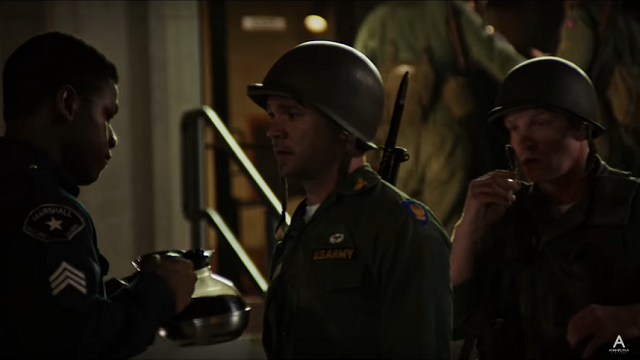Let’s talk about that Detroit trailer…
Detroit is the first film from Katheryn Bigelow since 2012’s CIA torture film Zero Dark Thirty. Based on John Hersey’s book The Algiers Motel Incident, a non-fiction dissection of one of many stories that occurred during the 1967 Detroit Riots, Bigelow’s new movie focuses on a small but notorious incident that some have inflated to embody the whole essence of the riot. Consider me skeptical of this.
Listen. I love Bigelow’s films. I think she is one of the smartest directors of the action/drama hybrid that I’ve seen in awhile. She understands the construction of cinema and knows how and where to subvert the expectations for maximal impact. But, here’s the problem: this is not her story. Echoing Laura Mulvey’s criticisms of how male directors used both plot construction and formal technique to reinforce the expected gender constructs, even if this was unconsciously, I don’t know that Bigelow has the cultural experience to direct Detroit.
Bigelow is a very coastal director. Born in San Carlos, CA (halfway between San Francisco and San Jose), she has spent much of her life either in New York or LA. After living on the coast, she enrolled in San Francisco Academy of Art and was accepted to study at the Whitney in NYC. Her Detroit screenwriter is no better. Mark Boal is a Jewish guy born in the Bronx, who wasn’t even born during the time of the Detroit riots.
Detroit, the city, has a very specific vibe and culture. In 2015, HuffPo listed Detroit Metro as the second-most segregated metropolitan area in the United States. Detroit is one of the blackest cities in America, while neighboring Dearborn currently has one of the highest concentrations of Arabic people outside the Middle East* and nearby Livonia (about 20 miles west of Detroit) is the second least diverse (read: whitest) city in the nation. By 1967, the forces that created this atmosphere were already in motion. Namely, white flight was already in high gear, as the white middle class had been leaving Detroit for the suburbs, and taking their tax base with them.
The racial gap crafted the culture surrounding the Detroit riots. Racist policing, inadequate schools, racist hiring practices, and a segregationist attitude crafted the tense atmosphere that led to a the five day riots after the police raided a blind pig intent on arresting the 80+ revelers in the establishment. President Johnson called in the army, etc etc.
My point in bringing all this historicity up is…lifelong coastal white person Kathryn Bigelow may not be the best person to craft this story. The racism affected behavior from the public to the personal. Hearing the northern white mayor of Dearborn loudly boast of the anti-negro sentiments in his city, asserting that the racism is even stronger than it is in Alabama, might be an odd experience to those who are used to hearing about the north’s “closet” racism. Maybe I’m being possessive and protective and precious with Detroit because I know that metro area.** But, I’m not sure that Bigelow is going to make a movie as controversial as this story needs to be.
There’s a moment in the trailer that plays like a cheeky take on the Pepsi ad that recently came out. John Boyega, a British Black man, is playing a security guard protecting a store (2500+ stores were looted or burned over the week). He brings out some coffee to the US Army, which had only been deployed on the third day of riots. The army guy asks for sugar and Boyega says “Don’t push your luck.” It’s a cheeky winking moment aimed at modern pop culture, and implies a fictionalization that will strive to parallel modern racial tension with that of the past. This is compounded by calling a specific incident Detroit, as if Detroit is solely defined by one week of race riots as opposed to a century of growth, decline and possible rebirth.
I hope Bigelow proves me wrong on August 4th. I hope she is able to capture the region in a way that feels real. But, I’m wary and cautious…and protective. Surprisingly, I feel almost as protective about this story as I did about the Stonewall movie. Whether I like it or not, whether I realized it or not, the riots formed a major part of the culture in which I was raised. And, these riots are a fraught story that could easily go as wrong as President Johnson’s response.
*At a recent found footage night, they played footage about metro Detroit politics in the 1960s and 1970s, including a bunch of white women in Dearborn who wanted to keep their city white. It was interesting watching the blatant racism, but also fascinating in how recently and quickly the Middle Eastern population took over the city.
**Fun Fact: The Detroit Eagle (1985-2010), one of its more notorious gay leather bars, was in a former bank about 3 blocks away from W. Grand Blvd and 12th St

